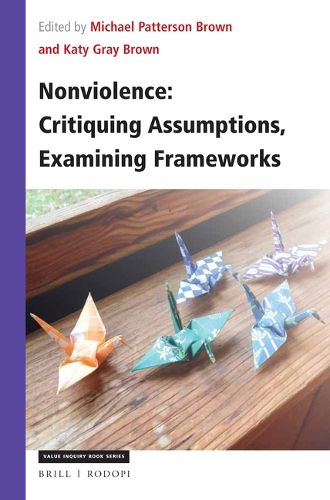Readings Newsletter
Become a Readings Member to make your shopping experience even easier.
Sign in or sign up for free!
You’re not far away from qualifying for FREE standard shipping within Australia
You’ve qualified for FREE standard shipping within Australia
The cart is loading…






Many judgments regarding what is good or bad, possible or impossible, rely upon unspoken assumptions or frameworks which are used to view and evaluate events and actions. Philosophers uncover these hidden aspects of thoughts and judgments, scrutinizing them for soundness, validity, and fairness. These assumptions and frameworks permeate the topics of violence, nonviolence, war, conflict, and reconciliation; and these assumptions influence how we address these problems and issues.
The papers in this volume explore what kind of assumptions and frameworks would be needed in order for people to see nonviolence as a sensible approach to contemporary problems. Topics include conceptions of positive peace, nonviolence and international structures, and perspectives on peace education.
Contributors are Elizabeth N. Agnew, Andrew Fitz-Gibbon, William C. Gay, Ronald J. Glossop, Ian M. Harris, John Kultgen, Joseph C. Kunkel, Douglas Lewis, Danielle Poe and Harry van der Linden.
$9.00 standard shipping within Australia
FREE standard shipping within Australia for orders over $100.00
Express & International shipping calculated at checkout
Many judgments regarding what is good or bad, possible or impossible, rely upon unspoken assumptions or frameworks which are used to view and evaluate events and actions. Philosophers uncover these hidden aspects of thoughts and judgments, scrutinizing them for soundness, validity, and fairness. These assumptions and frameworks permeate the topics of violence, nonviolence, war, conflict, and reconciliation; and these assumptions influence how we address these problems and issues.
The papers in this volume explore what kind of assumptions and frameworks would be needed in order for people to see nonviolence as a sensible approach to contemporary problems. Topics include conceptions of positive peace, nonviolence and international structures, and perspectives on peace education.
Contributors are Elizabeth N. Agnew, Andrew Fitz-Gibbon, William C. Gay, Ronald J. Glossop, Ian M. Harris, John Kultgen, Joseph C. Kunkel, Douglas Lewis, Danielle Poe and Harry van der Linden.